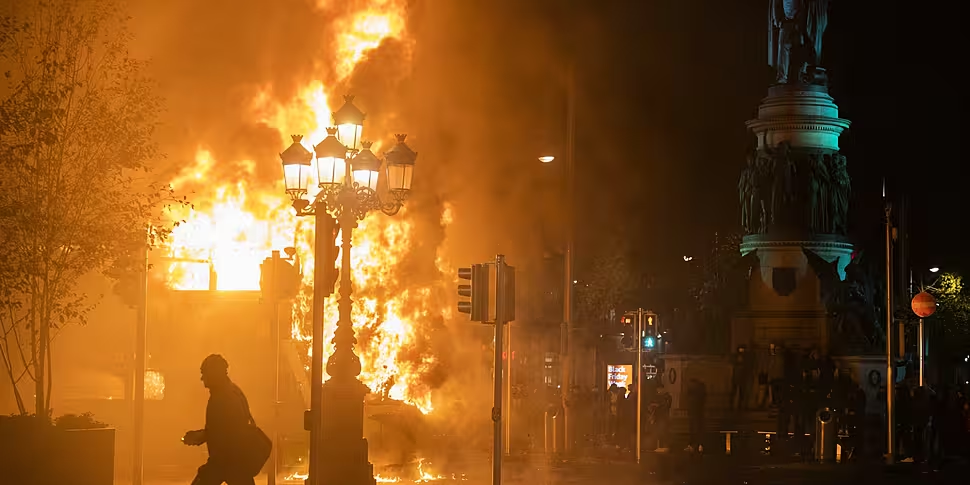2023 has been another dramatic year for Ireland and the world.
Here are five of the stories this year will be remembered for.
War in the Middle East
On October 7th, the world changed tragically forever.
Almost 50 years to the day after the Yom Kippur War, Hamas militants launched the most devastating attack on Israel in decades.
The invasion left some 1,500 people dead and hundreds more were dragged into captivity in Gaza. It was the single largest loss of Jewish life since the Holocaust.
Israel responded by declaring war on Hamas and Prime Minister Benjamin Netanyahu vowed to “eliminate” the organisation.
Since then, thousands of IDF bombs have hurtled towards Gaza and, according to local officials, some 20,000 people have died.
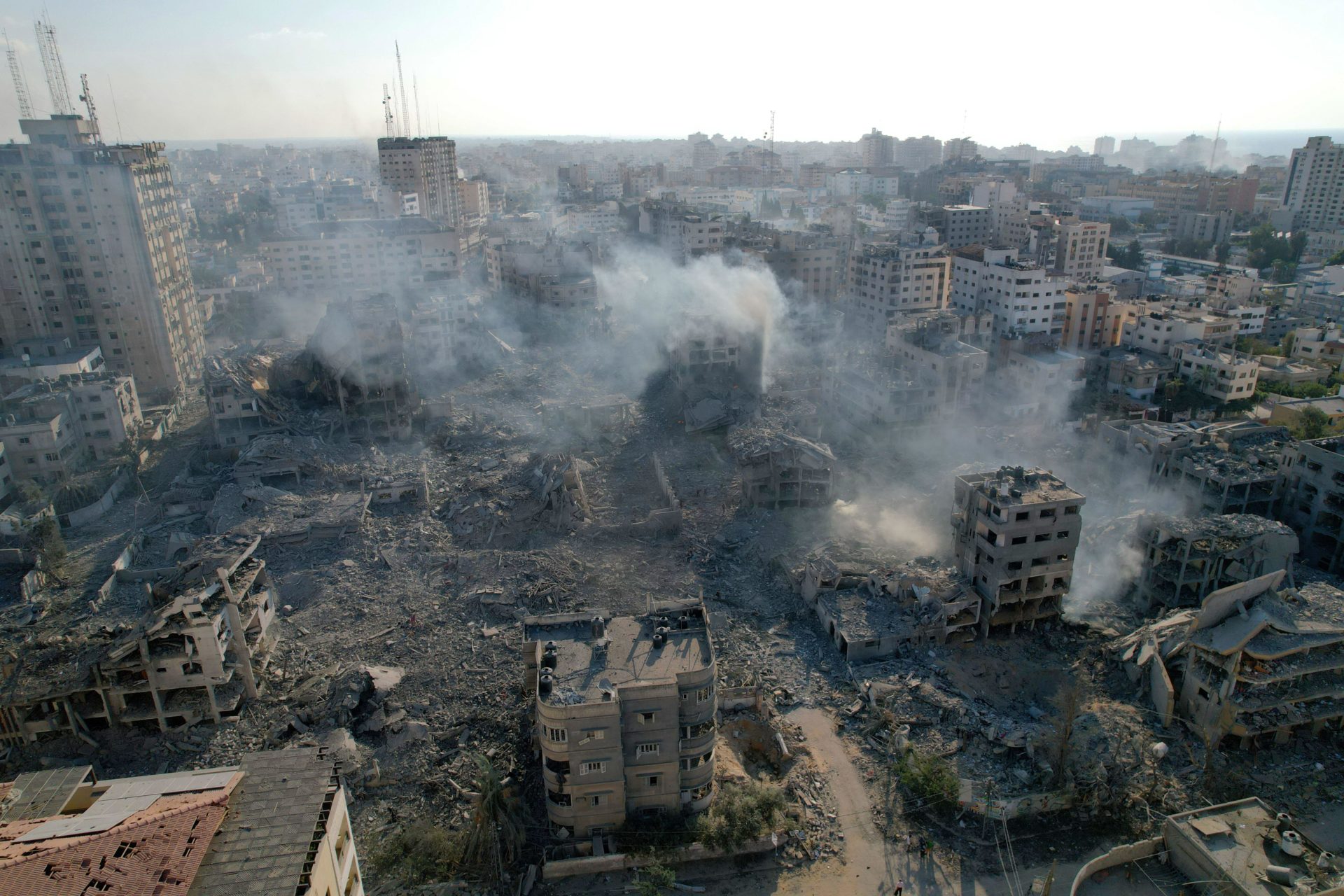 Widespread damage to buildings near the Palestine Tower in Gaza City after bombardment by Isreali forces. October 2023.
Widespread damage to buildings near the Palestine Tower in Gaza City after bombardment by Isreali forces. October 2023.Life in a territory under constant bombardment means surgery is routinely carried out without anaesthetic and danger, disease and hunger are a part of daily life.
The consequences of the conflict have rippled across the globe.
In Ireland, countless demonstrations have been held in solidarity with Palestine and there is a political consensus that the way in which Israel is waging this war is wrong.
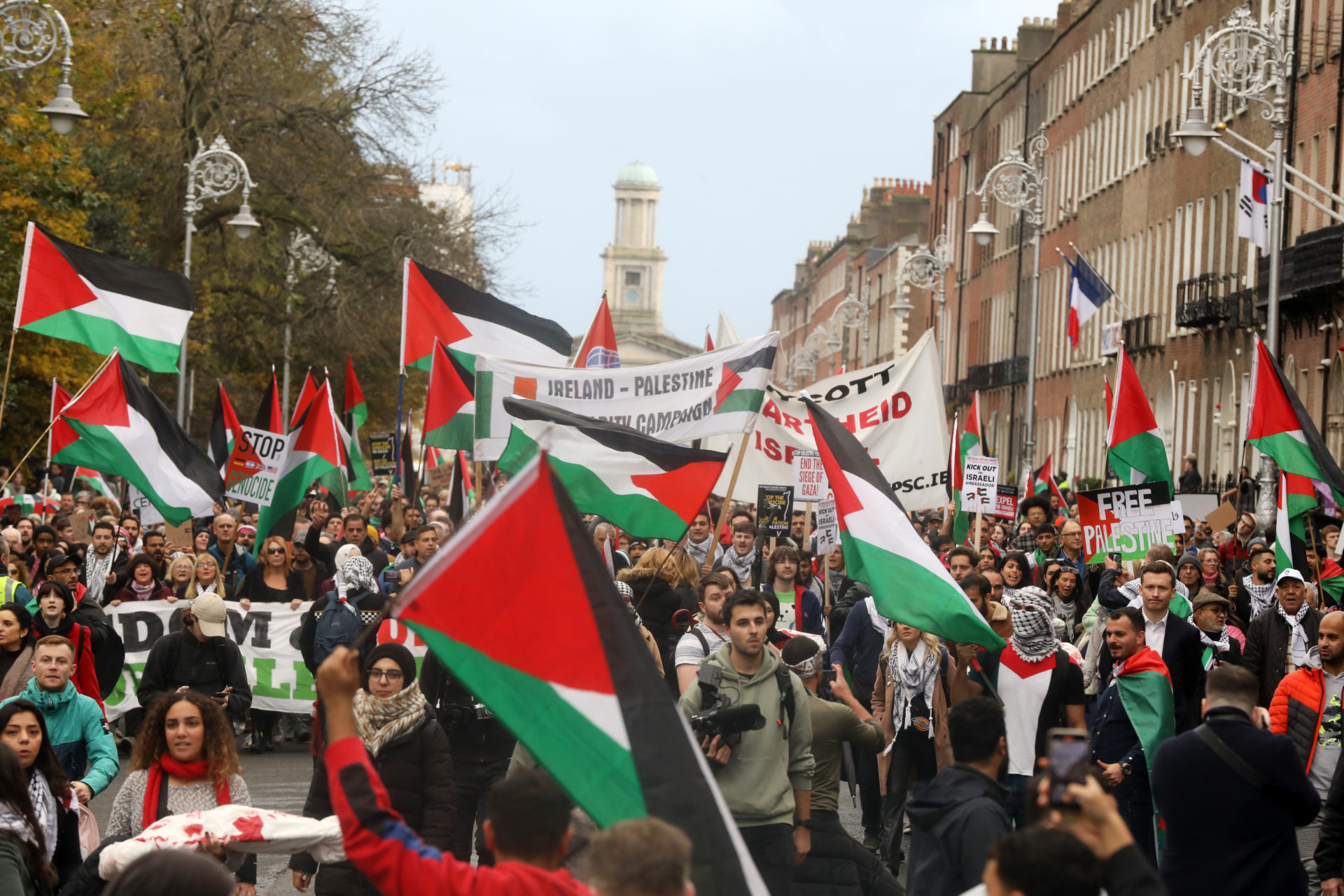 A demonstration in Dublin's Merrion Square in support of Palestine. Image: Leah Farrell/© RollingNews.ie
A demonstration in Dublin's Merrion Square in support of Palestine. Image: Leah Farrell/© RollingNews.ieTaoiseach Leo Varadkar has described the European Union’s “very passive” policy towards Israel as “no longer sustainable” and called for the bloc to be more forceful in its advocacy of human rights.
The conflict has also left Ireland’s small Jewish community feeling fearful and isolated. Posters of the Hamas hostages have been ripped down, the Israeli Embassy has said anti-semitic graffiti has been spotted and some Jews have even decided to leave the country altogether.
Dublin’s Riots
November 23rd should have been like any other school day for the children of Gaelscoil Choláiste Mhuire on Dublin’s Parnell Square.
But as pupils poured out of their classrooms, three of them and a school care assistant in her 30s were viciously attacked.
A Brazilian Deliveroo driver, Caio Benicio, was hailed as the hero of the day for intervening and stopping the attacker with his helmet.
One of the victims, a five-year-old girl, was taken into surgery at the nearby Temple Street Hospital and spent time recovering in intensive care afterwards.
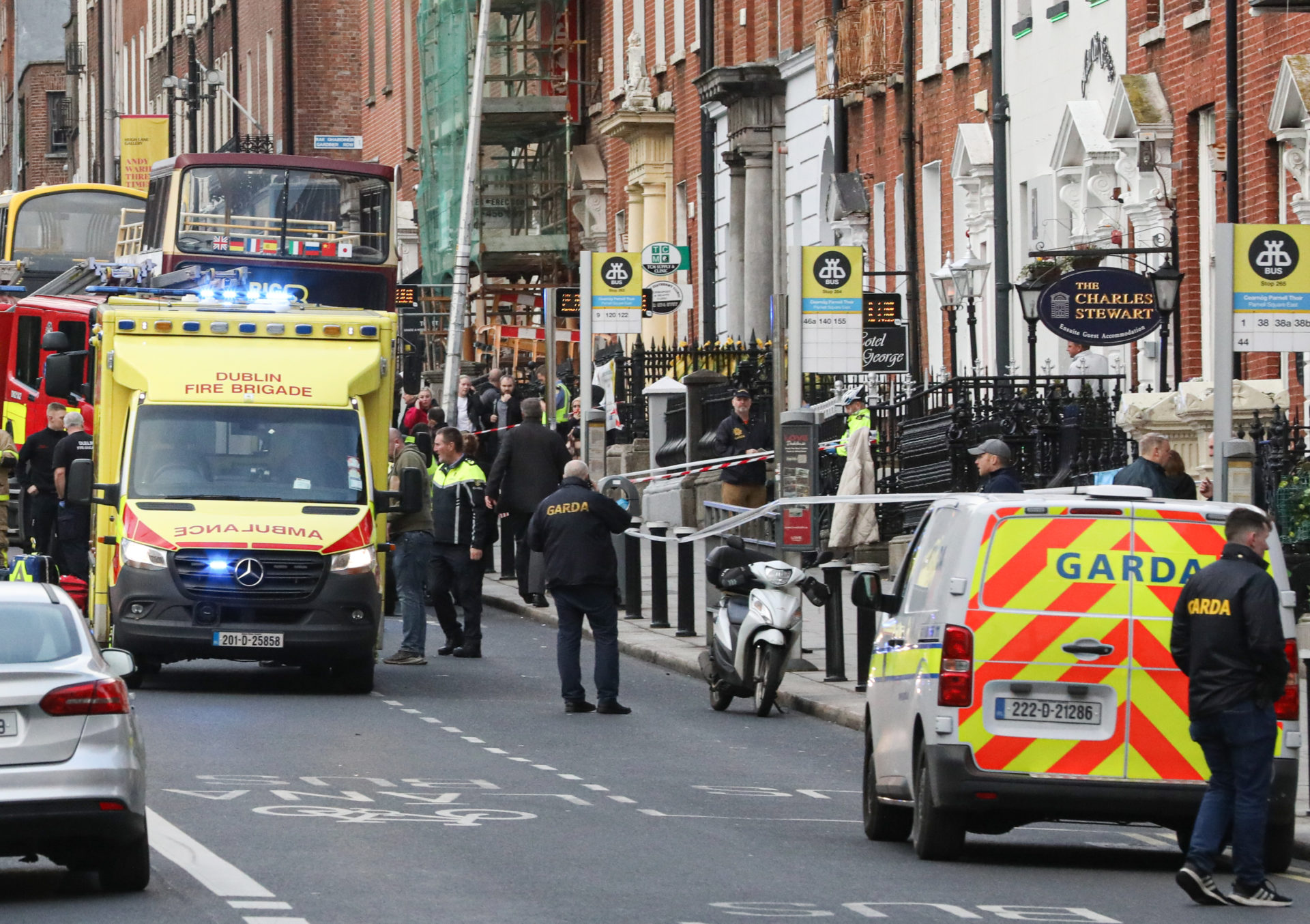 Gardaí at the scene where a woman and three children were attacked in Parnell Square in Dublin. 23/11/2023. Image: Sasko Lazarov/RollingNews
Gardaí at the scene where a woman and three children were attacked in Parnell Square in Dublin. 23/11/2023. Image: Sasko Lazarov/RollingNewsWithin minutes of the attack, phones across Dublin buzzed as angry messages were exchanged, speculating about the condition of the victims and the nationality of the alleged attacker.
A protest was organised for that evening on nearby O’Connell Street and it soon turned violent.
Gardaí were attacked, shops were looted and a Luas was burnt to a blackened crisp.
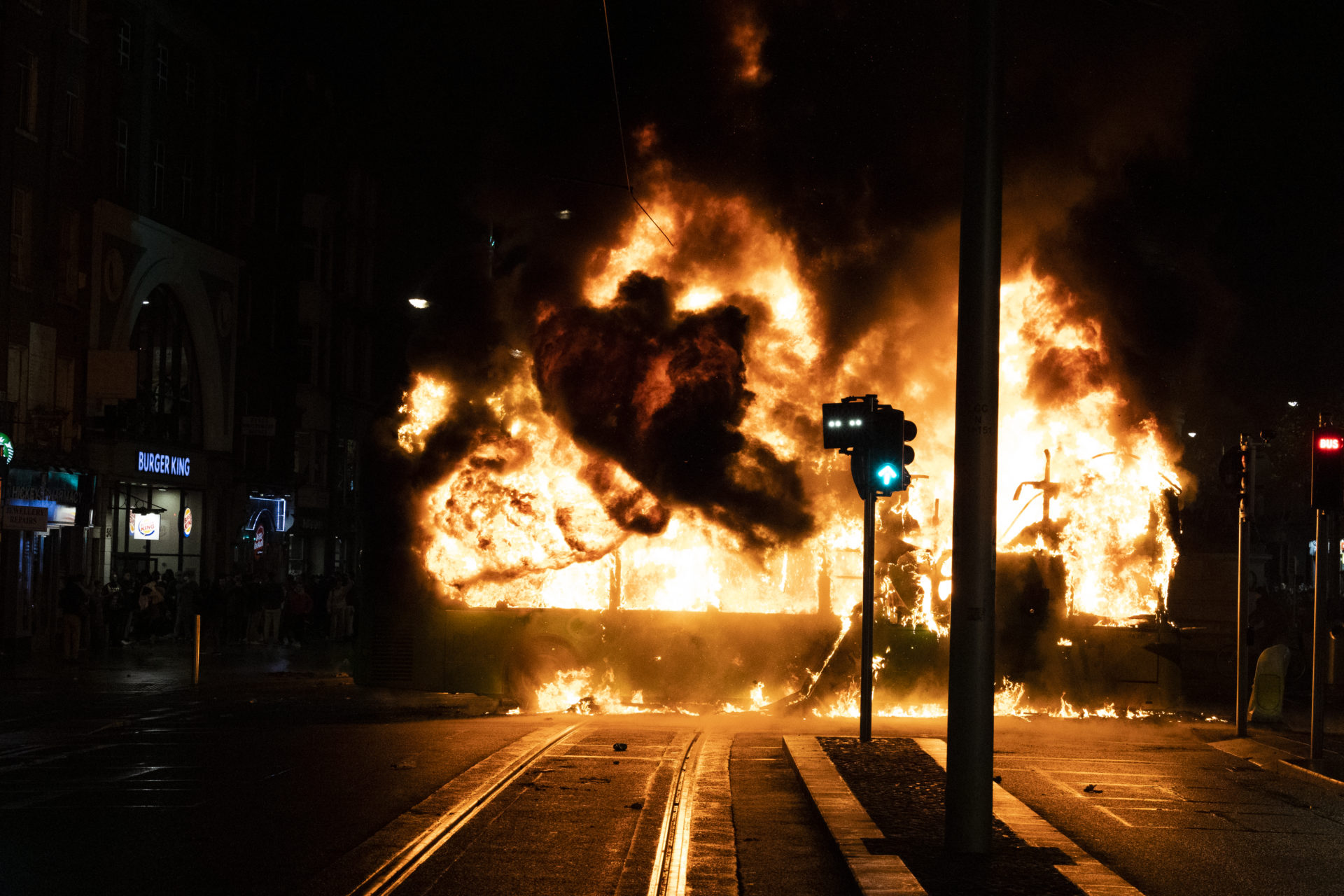 Rioting and looting in Dublin. Photo: Sam Boal/Rollingnews.ie
Rioting and looting in Dublin. Photo: Sam Boal/Rollingnews.ieIt was the single most violent day in Ireland this century and dozens of people have since been arrested and charged.
Taoiseach Leo Varadkar said the rioters had "brought shame" on Ireland and Garda Commissioner Drew Harris blamed the violence on a "lunatic, hooligan faction driven by a far-right ideology".
The riots also meant matters of law and order have soared to the top of the political agenda, persuading the Cabinet to deploy more Gardaí to the city centre and introduce more powers for the force.
The Ashling Murphy murder trial
On January 23rd last year, a 23-year-old primary school teacher called Ashling Murphy pulled on her running shoes and made a beeline for the Grand Canal in Tullamore, County Offaly.
There she bumped into a man, Jozef Puska, who she had never met before. The 31-year-old stabbed her 11 times in her neck and fled.
Efforts to revive her by Gardaí failed and Ms Murphy was pronounced dead at the scene.
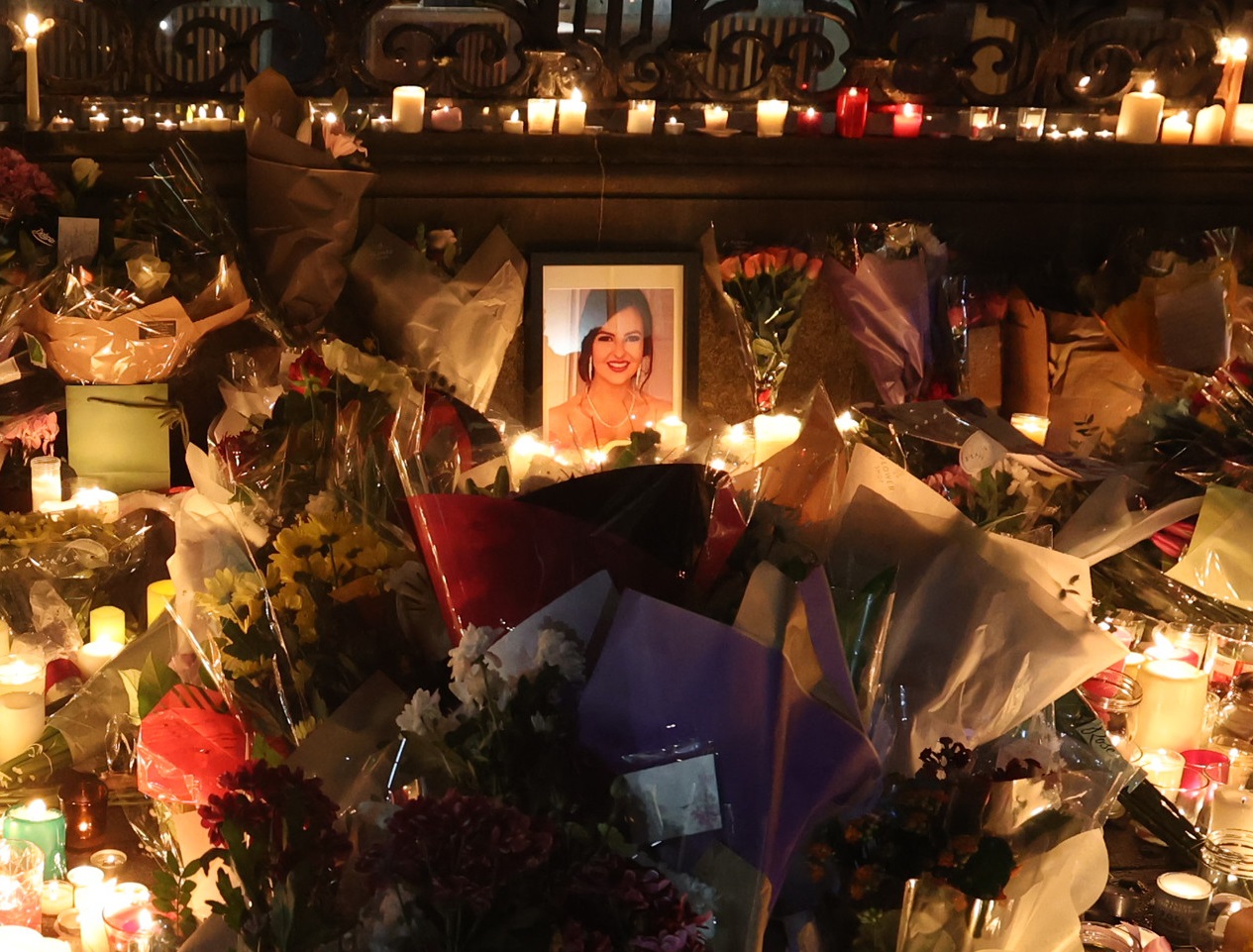 Candles outside Dáil Éireann in Dublin at a National Women's Council vigil for Ashling Murphy on January 14th 2022. Image: Sam Boal / RollingNews.ie
Candles outside Dáil Éireann in Dublin at a National Women's Council vigil for Ashling Murphy on January 14th 2022. Image: Sam Boal / RollingNews.iePuska was arrested and on January 19th charged with her murder, setting in train a series of events that led to his trial this autumn.
In the dock, he concocted a fantasy world where he had in fact been helping Ms Murphy instead of attacking her, that her killer had also stabbed him and that he was completely innocent of wrongdoing.
It was all a lie.
 An artist's impression of 33-year-old Jozef Puska in the dock at the Central Criminal Court in Dublin. 02/11/2023. Image: PA Images/Alamy
An artist's impression of 33-year-old Jozef Puska in the dock at the Central Criminal Court in Dublin. 02/11/2023. Image: PA Images/AlamyOn November 9th, a jury filed back into Dublin’s Central Criminal Court and informed the Judge they had reached a verdict. The nine men and three women had unanimously agreed that Puska killed Ms Murphy.
In the words of the prosecution, the evidence had been “overwhelming” and Mr Justice Tony Hunt commended the jury for their speedy dismissal of Puska’s “nonsense”.
“We have evil in this room,” he told the court before handing the father of five a life sentence.
Windsor Framework
On February 27th, Ursula von der Leyen arrived in London and found herself whisked away to the nearby town of Windsor.
The European Commission President was in that most of English places, for centuries the home of the British monarchy, to bury the controversial Northern Ireland Protocol.
Joined by British Prime Minister Rishi Sunak, the pair announced that a new agreement would govern post-Brexit trading arrangements between Northern Ireland and Great Britain - the Windsor Framework.
After months of thorny negotiations, the two sides had agreed to the relaxations of rules governing checks between the goods travelling across the Irish Sea.
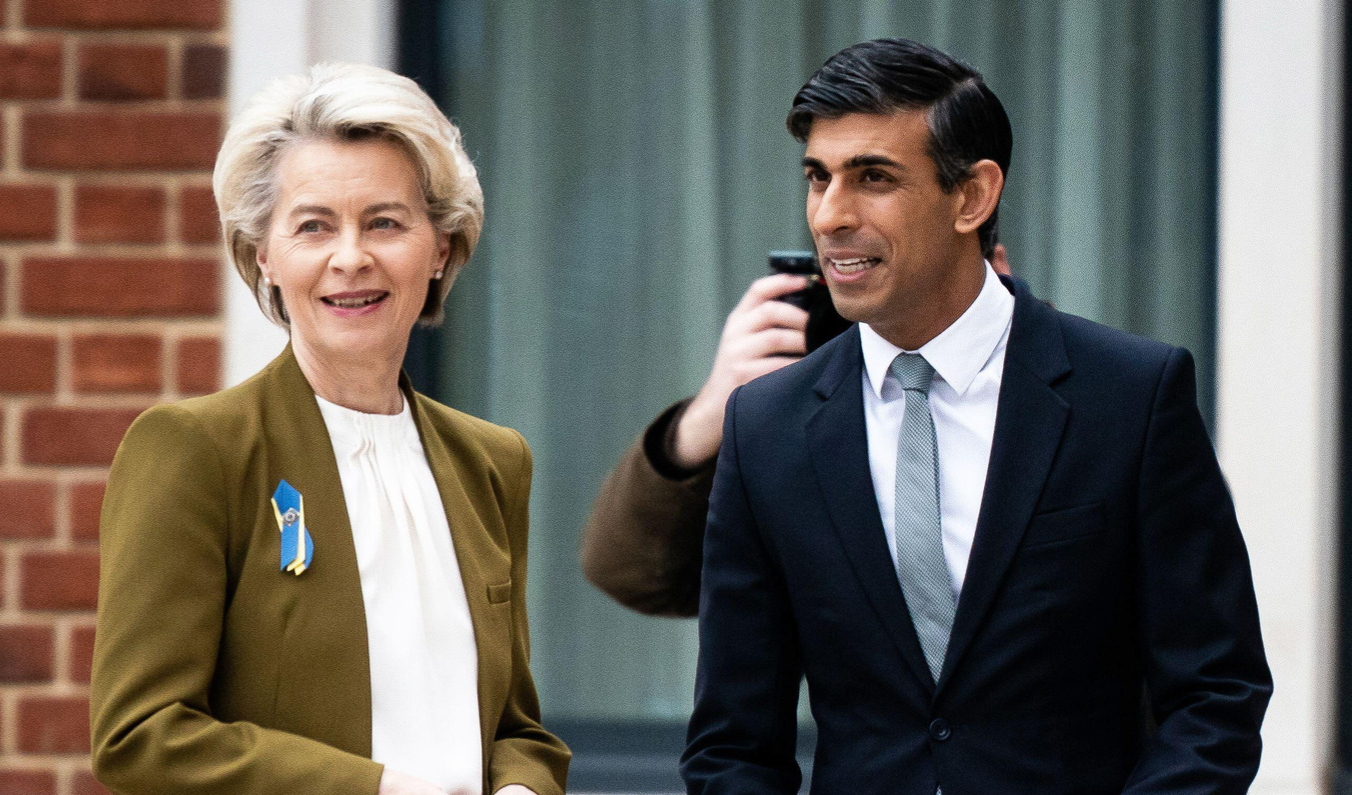 British Prime Minister Rishi Sunak welcomes European Commission President Ursula von der Leyen ahead of a Brexit meeting, 27-02-2023. Image: PA Images / Alamy
British Prime Minister Rishi Sunak welcomes European Commission President Ursula von der Leyen ahead of a Brexit meeting, 27-02-2023. Image: PA Images / AlamyA trusted trader scheme was to be created and there would be significantly less paperwork for goods destined to be sold in Northern Ireland.
The Northern Ireland Assembly was also handed a ‘handbrake’ that allows it to veto EU laws that are not in the best interests of the province.
For some unionists, it was never going to be enough. Northern Ireland remains subject to certain aspects of EU law and there will still be some customs checks on goods arriving from Great Britain.
 Graffiti reading 'No Irish Sea border' near Belfast City centre in February 2021. Picture by: PA Images / Alamy Stock Photo
Graffiti reading 'No Irish Sea border' near Belfast City centre in February 2021. Picture by: PA Images / Alamy Stock PhotoThe DUP, who collapsed the Northern Ireland Executive because of their unhappiness with the Protocol, have yet to give their final assessment of the deal.
The British Government has also offered them a £3.3 billion financial package to sweeten the deal - but will it be enough to persuade the party to return to power sharing?
Weather
Did you have a conversation about the weather this summer? The chances are you weren’t the only one.
Ireland sizzled in the month of June. There was so little rain Met Éireann officially recorded an absolute drought.
The following month could not have been more different.
July 2023 was the wettest in Ireland’s history. Day after day after day, people awoke to the disheartening sight of grey clouds and the drumbeat of raindrops.
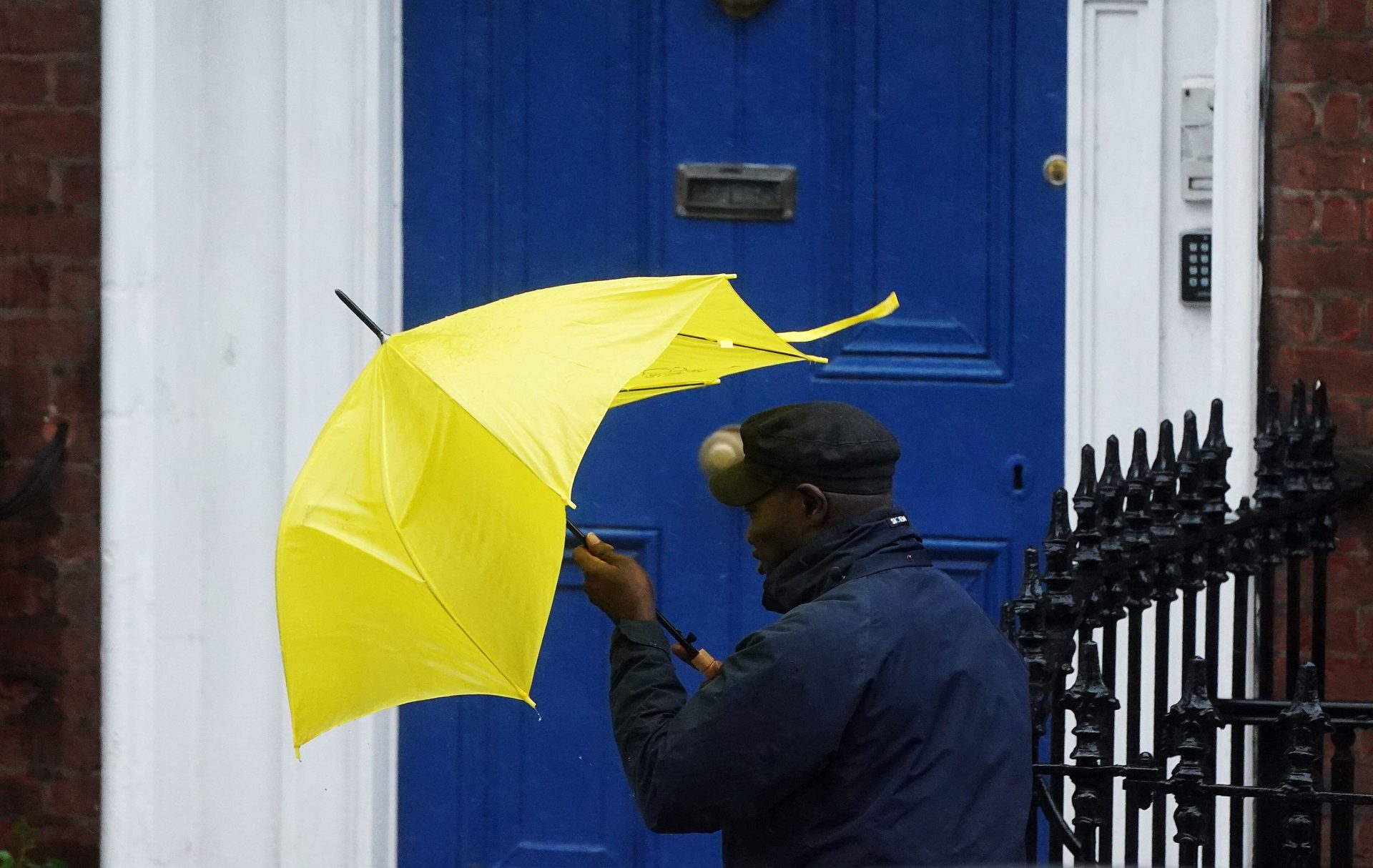 A man struggles with his umbrella in Dublin city centre. Image: PA Images / Alamy Stock Photo
A man struggles with his umbrella in Dublin city centre. Image: PA Images / Alamy Stock PhotoSometimes it all seemed more like winter than summer.
Unfortunately, scientists believe such extreme weather events will become more and more frequent as the climate changes.
In the words of Environment Minister Eamon Ryan, “We are seeing climate change hit home. It is now real intense rain, the likes of which we have never had before, so have to prepare for it.”
With the planet on course to warm more than 1.5° above pre-industrial levels, it looks like the summer of 2023 could be a template for many summers to come.
Main image: A fire on Dublin's O'Connell Street during looting and rioting on 23/11/2023. Image: Sam Boal/Rollingnews.ie


